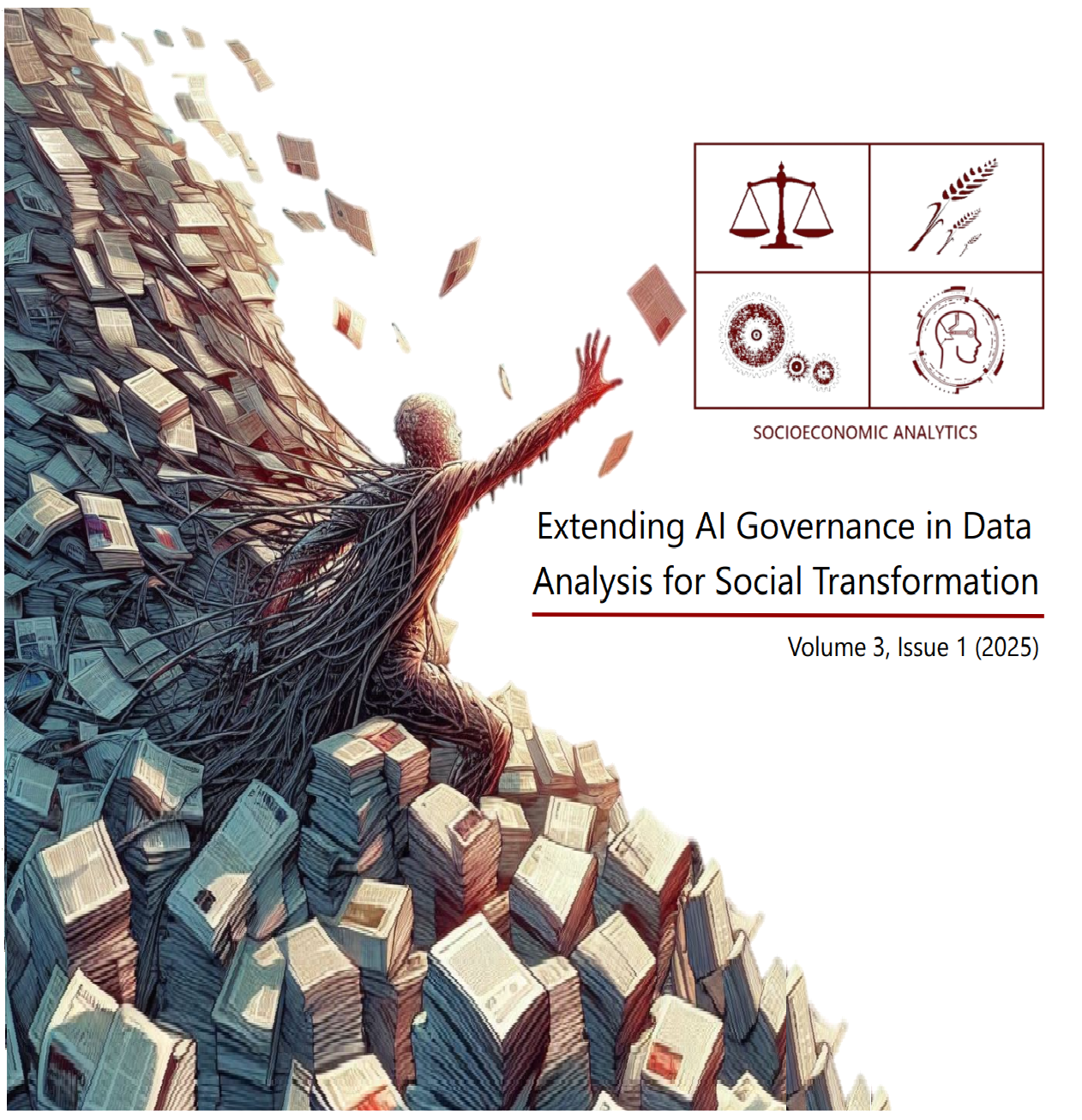The race for AI hegemony
DOI:
https://doi.org/10.51359/2965-4661.2025.265565Keywords:
Artificial Intelligence, race, hegemony, political polarization, responsability, ethicsAbstract
The growing use of Artificial Intelligence (AI) raises technical, economic, social, legal, and ethical questions. AI can transform industries, automate tasks, and create jobs, but it also brings concerns about infrastructure, resource redistribution, inequality, regulation, and ethics. The race for AI Hegemony between the US and China intensifies economic and political polarization. Investments in research and development will be massive, with competition for talent and resources. Without international coordination, the uncontrolled advance of AI could threaten security and social justice. An inclusive debate is essential to ensure the responsible use of this technology. This text was motivated by recent geopolitical events (already in the first month of 2025), which directly affect people's daily lives worldwide, leaving possible reflections on the power of AI as an active agent in shaping the future of humanity.
References
Ali, M., Khan, T. I., Khattak, M. N., & Şener, İ. (2024). Synergizing AI and business: Maximizing innovation, creativity, decision precision, and operational efficiency in high-tech enterprises. Journal of Open Innovation: Technology, Market, and Complexity, 10(3). https://doi.org/10.1016/j.joitmc.2024.100352
Booth, H. (2025). How China Is Advancing in AI Despite U.S. Chip Restrictions. Time. https://time.com/7204164/china-ai-advances-chips/
Brauner, S., Murawski, M., & Bick, M. (2023). The development of a competence framework for artificial intelligence professionals using probabilistic topic modelling. Journal of Enterprise Information Management. https://doi.org/10.1108/JEIM-09-2022-0341
Chan-Olmsted, S., Chen, H., & Kim, H. J. (2024). In smartness we trust: consumer experience, smart device personalization and privacy balance. Journal of Consumer Marketing, 41(6), 597–609. https://doi.org/10.1108/JCM-12-2021-5072
Cocchiaro, M. Z., Morley, J., Novelli, C., Panai, E., Tartaro, A., & Floridi, L. (2024). Who is an AI Ethicist? An Empirical Study of Expertise, Skills, and Profiles to Build a Competency Framework (Vol. 16, Issue 1, pp. 1–23). https://doi.org/10.2139/ssrn.4891907
de Carvalho, V. D. H., & Costa, A. P. C. S. (2022). Towards Corpora Creation from Social Web in Brazilian Portuguese to Support Public Security Analyses and Decisions. Library Hi Tech, in press. https://doi.org/10.1108/LHT-08-2022-0401
de Carvalho, V. D. H., & Costa, A. P. C. S. (2023). Exploring Text Mining and Analytics for Applications in Public Security: an in-depth dive into a systematic literature review. Socioeconomic Analytics, 1, 5–55. https://doi.org/10.51359/2965-4661.2023.259008
de Carvalho, V. D. H., Nepomuceno, T. C. C., Poleto, T., & Costa, A. P. C. S. (2022). The COVID-19 Infodemic on Twitter: A Space and Time Topic Analysis of the Brazilian Immunization Program and Public Trust. Tropical Medicine and Infectious Disease, 7(12). https://doi.org/10.3390/tropicalmed7120425
de Carvalho, V. D. H., Nepomuceno, T. C. C., Poleto, T., Turet, J. G., & Costa, A. P. C. S. (2022). Mining Public Opinions on COVID-19 Vaccination: A Temporal Analysis to Support Combating Misinformation. Tropical Medicine and Infectious Disease, 7(10), 256. https://doi.org/10.3390/tropicalmed7100256
de Carvalho, V. D. H., Todaro, M. S. F., dos Santos, R. J. R., Nepomuceno, T. C. C., Poleto, T., Figueiredo, C. J. J., Turet, J. G., & de Moura, J. A. (2024). AI-Driven Decision Support in Public Administration: An Analytical Framework. In Information Technology and Systems (pp. 237–246). Springer. https://doi.org/10.1007/978-3-031-54235-0_22
Duffy, C. (2024). Trump announces a $500 billion AI infrastructure investment in the US. CNN Business. https://edition.cnn.com/2025/01/21/tech/openai-oracle-softbank-trump-ai-investment/index.html
Gerlich, M. (2024). Brace for Impact: Facing the AI Revolution and Geopolitical Shifts in a Future Societal Scenario for 2025–2040. Societies, 14(9). https://doi.org/10.3390/soc14090180
Marr, B. (2024). The Geopolitics Of AI. Forbes. https://www.forbes.com/sites/bernardmarr/2024/09/18/the-geopolitics-of-ai/
Mochizuki, Y., & Vickers, E. (2024). UNESCO, the geopolitics of AI, and China’s engagement with the futures of education. Comparative Education, 60(3), 478–497. https://doi.org/10.1080/03050068.2024.2335125
Ning, W. (2024). A Legal and Ethical Review of Artificial Intelligence Technology in Public Safety Management. Applied Mathematics and Nonlinear Sciences, 9(1), 3383–3392. https://doi.org/10.2478/amns-2024-0954
Ozturk, O. (2024). The Impact of AI on International Trade: Opportunities and Challenges. Economies, 12(11), 298. https://doi.org/10.3390/economies12110298
Rakowski, R., & Kowaliková, P. (2024). The political and social contradictions of the human and online environment in the context of artificial intelligence applications. Humanities and Social Sciences Communications, 11(1), 1–8. https://doi.org/10.1057/s41599-024-02725-y
Saló, C. C., & Galceran-vercher, M. (2024). Las otras geopolíticas de la inteligencia artificial The other geopolitics of AI. 27–50.
Shankar, V. (2024). Managing the Twin Faces of AI: A Commentary on “Is AI Changing the World for Better or Worse?” Journal of Macromarketing, 44(4), 892–899. https://doi.org/10.1177/02761467241286483
Shao, Z., Yuan, S., Wang, Y., & Xu, J. (2022). Evolutions and trends of artificial intelligence (AI): research, output, influence and competition. Library Hi Tech, 40(3), 704–724. https://doi.org/10.1108/LHT-01-2021-0018
Sharma, S. (2023). Trustworthy Artificial Intelligence: Design of AI Governance Framework. Strategic Analysis, 47(5), 443–464. https://doi.org/10.1080/09700161.2023.2288994
Smuha, N. A. (2021). From a ‘race to AI’ to a ‘race to AI regulation’: regulatory competition for artificial intelligence. Law, Innovation and Technology, 13(1), 57–84. https://doi.org/10.1080/17579961.2021.1898300
Stepanović, I. (2024). Towards a human-centered education in the age of algorithmic governance. Prospects, 54(2), 459–466. https://doi.org/10.1007/s11125-023-09675-4
Ul Mansoor, S. I. (2024). China’s Geopolitical Strategy: Crafting a New World Order. China Quarterly of International Strategic Studies, 0(September 2024), 337–359. https://doi.org/10.1142/S2377740023500161
Xu, F., Zheng, X., Lin, L., Chen, S., & Altrjman, C. (2023). Research on Artificial Intelligence Ethical Risk of Threat Intelligence Analysis and Electronic Forensics. In Tenth International Conference on Applications and Techniques in Cyber Intelligence (pp. 688–696). Springer. https://doi.org/10.1007/978-3-031-29097-8_82
Yang, S., Hussain, M., Ammar Zahid, R. M., & Maqsood, U. S. (2024). The role of artificial intelligence in corporate digital strategies: evidence from China. Kybernetes. https://doi.org/10.1108/K-08-2023-1583
Zhang, M., Dong, Q., & Wu, X. (2024). How Misinformation Diffuses on Online Social Networks: Radical Opinions, Adaptive Relationship, and Algorithmic Intervention. IEEE Transactions on Computational Social Systems, PP, 1–15. https://doi.org/10.1109/TCSS.2024.3502662
Downloads
Additional Files
Published
Issue
Section
License
Copyright (c) 2025 Victor Diogho Heuer de Carvalho

This work is licensed under a Creative Commons Attribution-NonCommercial-NoDerivatives 4.0 International License.
Authors who publish with Socioeconomic Analytics retain the copyright of their work and agree to license it under a Creative Commons Attribution-NonCommercial-NoDerivatives 4.0 International (CC BY-NC-ND 4.0) license. This means that the work can be shared, copied, and redistributed in any medium or format, as long as it is not used for commercial purposes, and the original work is properly cited. The work cannot be changed in any way or used to create derivative works.










